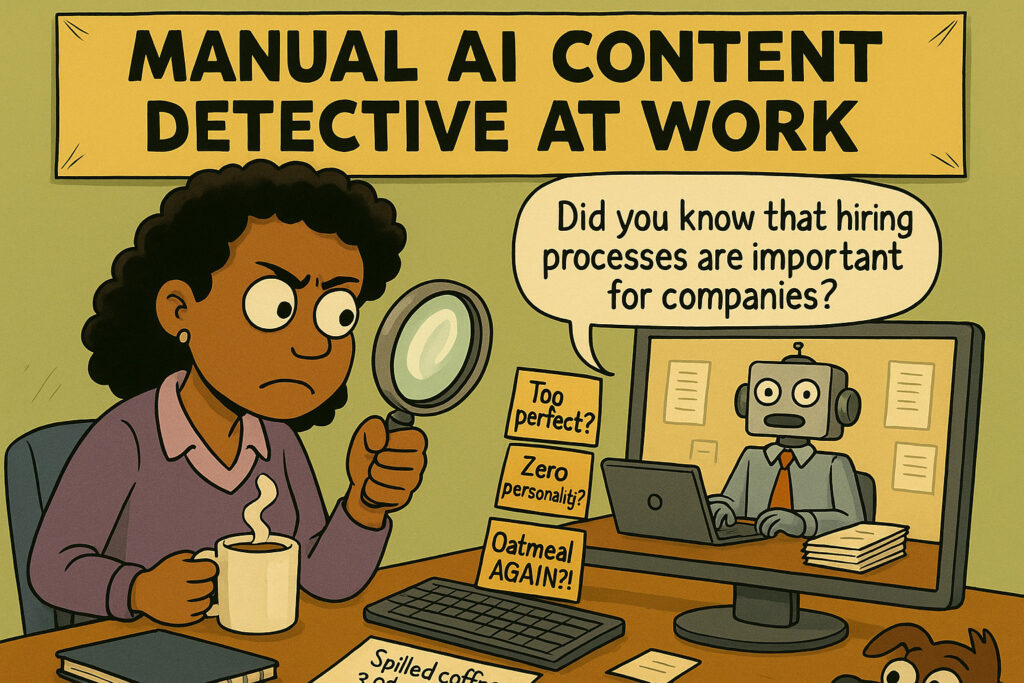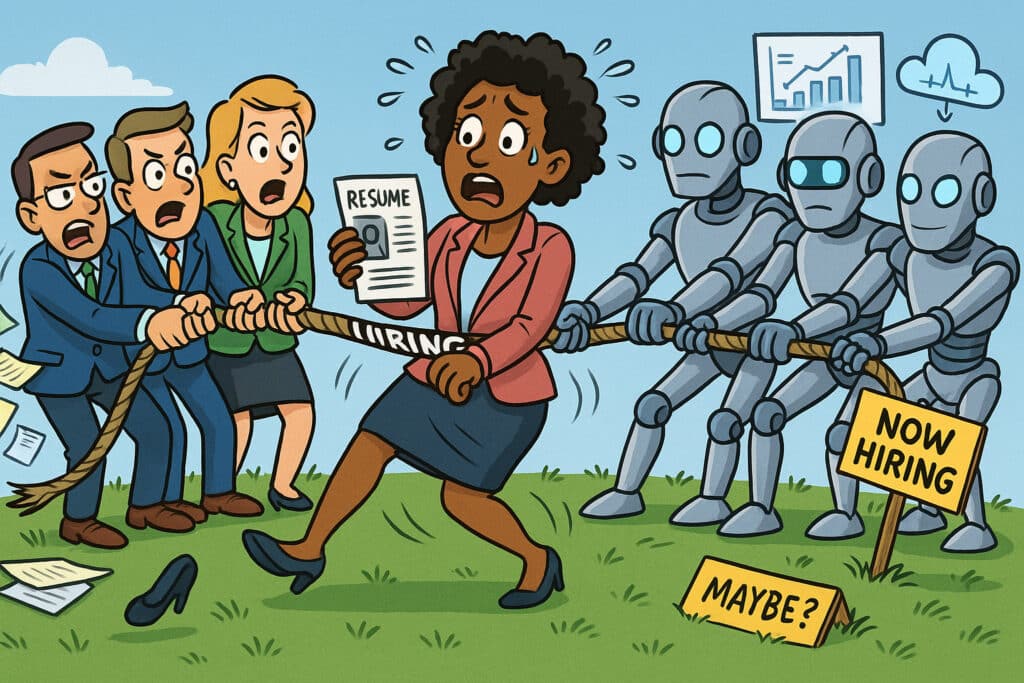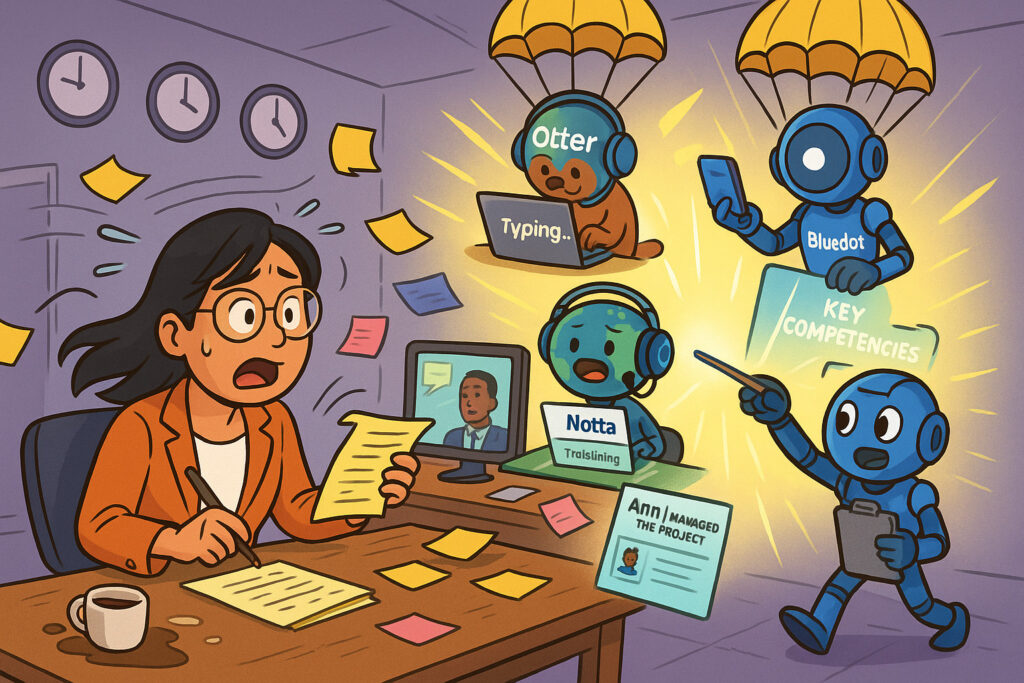I’ve spent enough time tinkering behind the scenes in IT at recruiting firms to know how wild the content world’s gotten lately. If you’ve ever stared at a blog post and wondered, “Was this really written by a person, or did a robot cook it up in a data center somewhere?” — you’re not alone. I wrote a deep dive on this topic called AI Content Detection and Its Impact on Modern Hiring if you want all the nitty gritty (and yes, I mention GPTzero in there, too). But maybe you don’t want to use a tool. Good news: You can spot robot-written copy with just your eyeballs if you know what to look for—and AI content detection is easier than you think.

Here are five dead giveaways I always check:
- Everything Sounds the Same, All the Time
Ever read something that feels like it’s stuck in a loop? AI loves to recycle the same sentence shapes and phrases—over and over. It’s like eating plain oatmeal for every meal: bland, predictable, and you’re begging for a little spice. Human writers, on the other hand, mix it up. One sentence is short, the next rambles on. We use fragments. We change things up to keep you awake. If every paragraph feels like déjà vu, you might be dealing with a bot. - Where’s the Personality?
Humans are messy. We tell stories about that time we spilled coffee on our keyboard or throw in a joke when things get boring. AI? Not so much. If the writing feels colder than your office AC in January and never says “I” or “you,” that’s a hint. Real writers slip in personal takes, a bit of attitude, or weird analogies. Robots… well, they haven’t lived, so they can’t riff on Monday morning disasters or their dog barking during Zoom calls. - Super Predictable and Kinda Boring
There’s this thing called “perplexity”—fancy word, I know. But all it means is, does the writing surprise you, or could you guess what comes next? AI tries to keep things as predictable as possible, like a waiter who always brings you plain water, never a twist of lemon. Human writing throws in odd word choices, weird little tangents, or just says things in ways you didn’t expect. Manual AI content detection comes down to spotting this predictability. - No Typos or Slang—Is That… Normal?
If the grammar is so perfect it makes you nervous, and you never spot a “don’t” or “can’t” (just “do not” and “cannot”), that’s suspicious. Most humans mess up, or at least get casual now and then. AI plays it safe and formal, and sometimes you can almost hear the robot voice reading it aloud. - Nothing New, No Real Take
Maybe this is the biggest clue: AI tends to play it safe, giving you info you could Google in two seconds. There’s nothing bold or especially specific—just surface-level facts. If the writing doesn’t offer any hot takes, personal stories, or quirky details, it might not come from someone who’s actually “been there, done that.”
Bottom Line:
Trust your gut. If something reads like a Wikipedia article but without the personality, or it feels weirdly bland and repetitive, you might be staring at AI-generated content. Manual AI content detection is quickly becoming an essential skill, especially for anyone in recruiting or content review. If you want more tips or want to geek out with me on how this stuff affects recruiting (seriously, it’s wild), check out my article on AI Content Detection and Its Impact on Modern Hiring. Oh, and if you do want a tool, GPTzero is pretty popular in the space.
FAQ: Spotting AI-Generated Content in Recruiting
What are the biggest signs that a blog post was written by AI, not a real person?
Great question! The easiest giveaways are super repetitive sentences, no personal stories or jokes, and grammar so perfect it almost feels fake. If the writing never surprises you and feels like you’re reading the same thing over and over, that’s a big hint a bot might be behind it.
Do I need a fancy tool to tell if content was AI-generated?
Nope! While tools like GPTzero are cool, you can usually trust your own eyes (and gut). Look for copy that’s bland, totally free of typos, and has zero personality. If it never uses “I” or “you,” or sounds like a Wikipedia entry that skipped its morning coffee, it’s probably AI.
Why does it matter if recruiting content is written by a human or AI?
Because personality and real-life takes matter! In recruiting, stories and a personal touch can make all the difference—whether it’s explaining a tech hiccup or sharing why a candidate stood out. Human writing connects better, stands out, and is way more memorable than just another AI-blended, cookie-cutter post.



